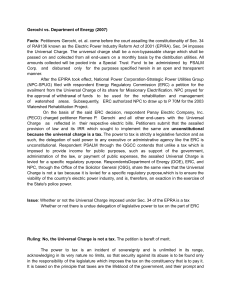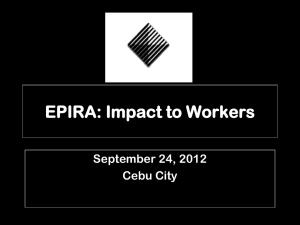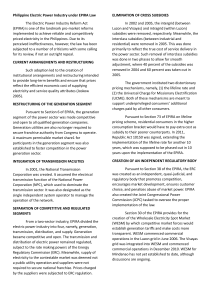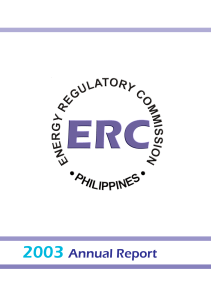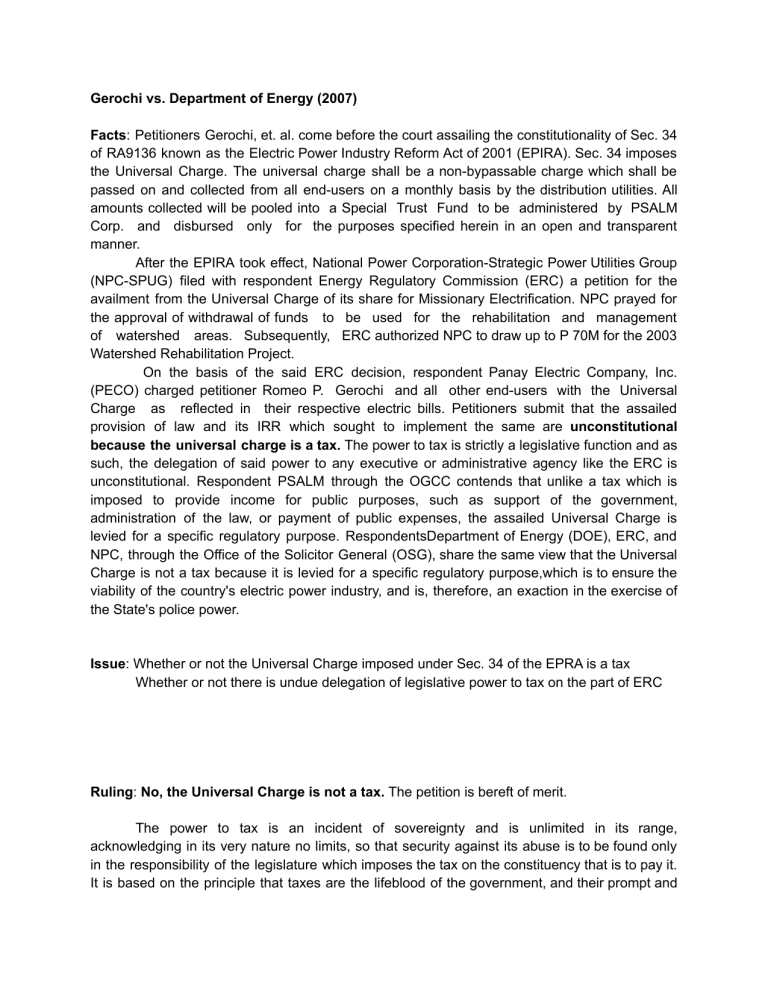
Gerochi vs. Department of Energy (2007) Facts: Petitioners Gerochi, et. al. come before the court assailing the constitutionality of Sec. 34 of RA9136 known as the Electric Power Industry Reform Act of 2001 (EPIRA). Sec. 34 imposes the Universal Charge. The universal charge shall be a non-bypassable charge which shall be passed on and collected from all end-users on a monthly basis by the distribution utilities. All amounts collected will be pooled into a Special Trust Fund to be administered by PSALM Corp. and disbursed only for the purposes specified herein in an open and transparent manner. After the EPIRA took effect, National Power Corporation-Strategic Power Utilities Group (NPC-SPUG) filed with respondent Energy Regulatory Commission (ERC) a petition for the availment from the Universal Charge of its share for Missionary Electrification. NPC prayed for the approval of withdrawal of funds to be used for the rehabilitation and management of watershed areas. Subsequently, ERC authorized NPC to draw up to P 70M for the 2003 Watershed Rehabilitation Project. On the basis of the said ERC decision, respondent Panay Electric Company, Inc. (PECO) charged petitioner Romeo P. Gerochi and all other end-users with the Universal Charge as reflected in their respective electric bills. Petitioners submit that the assailed provision of law and its IRR which sought to implement the same are unconstitutional because the universal charge is a tax. The power to tax is strictly a legislative function and as such, the delegation of said power to any executive or administrative agency like the ERC is unconstitutional. Respondent PSALM through the OGCC contends that unlike a tax which is imposed to provide income for public purposes, such as support of the government, administration of the law, or payment of public expenses, the assailed Universal Charge is levied for a specific regulatory purpose. RespondentsDepartment of Energy (DOE), ERC, and NPC, through the Office of the Solicitor General (OSG), share the same view that the Universal Charge is not a tax because it is levied for a specific regulatory purpose,which is to ensure the viability of the country's electric power industry, and is, therefore, an exaction in the exercise of the State's police power. Issue: Whether or not the Universal Charge imposed under Sec. 34 of the EPRA is a tax Whether or not there is undue delegation of legislative power to tax on the part of ERC Ruling: No, the Universal Charge is not a tax. The petition is bereft of merit. The power to tax is an incident of sovereignty and is unlimited in its range, acknowledging in its very nature no limits, so that security against its abuse is to be found only in the responsibility of the legislature which imposes the tax on the constituency that is to pay it. It is based on the principle that taxes are the lifeblood of the government, and their prompt and certain availability is an imperious need. On the other hand, police power is the power of the state to promote public welfare by restraining and regulating the use of liberty and property. It is the most pervasive, the least limitable,and the most demanding of the three fundamental powers of the State. If generation of revenue is the primary purpose and regulation is merely incidental, the imposition is a tax; but if regulation is the primary purpose, the fact that revenue is incidentally raised does not make the imposition a tax. The EPIRA provides a framework for the restructuring of the industry, including the privatization of the assets of the National Power Corporation (NPC), the transition to a competitive structure, and the delineation of the roles of various government agencies and the private entities. In exacting the assailed Universal Charge through Sec. 34 of the EPIRA, the State's police power, particularly its regulatory dimension, is invoked. Such can be deduced from Sec. 34 which enumerate the purposes for which the Universal Charge is imposed and which can be amply discerned as regulatory character.
